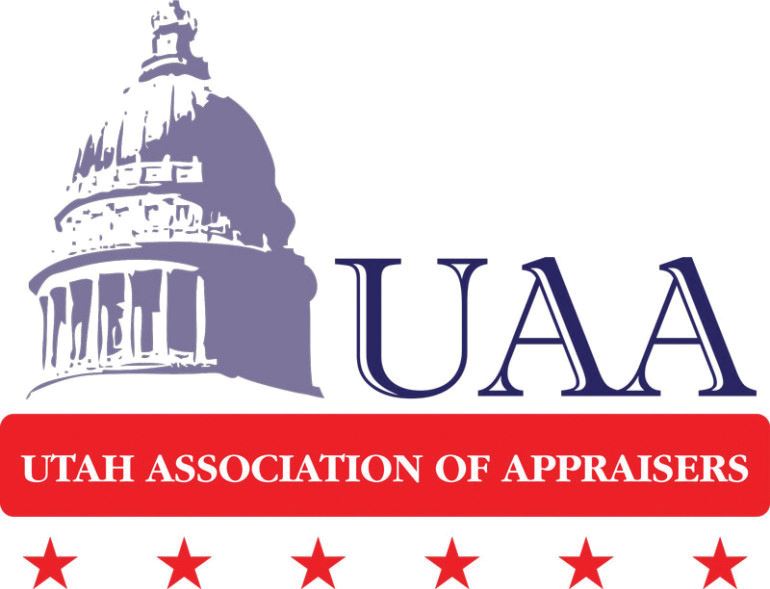|
Follow Us
Mission Statement
The mission of the Utah Association of Appraisers (UAA) is:
- To protect the public interest by promoting a Utah regulatory environment that safeguards honesty, competency, and enforceability of professional appraisal standards, and attracts quality individuals to the appraisal profession.
- To further a positive image for the appraisal profession in Utah through encouragement and support for independence, professional objectivity and practices of licensed and certified appraisers.
- To provide leadership, interpretation, and impetus on issues affecting the appraisal profession in Utah.
- To respond to national issues that have a potential to influence the regulatory environment, independence, professional objectivity, and practices of Utah appraisers.
Click here for a copy of our Bylaws.
Guiding Public Policy PrinciplesPROPERTY RIGHTSWe uphold the rights of individuals to buy, sell, and own property. We also sustain the right of individuals to develop their property to its highest and best use as long as the intended use does not materially diminish the property rights and inherent value of others and/or the public at large. FREE ENTERPRISEIndividuals and companies should have opportunity to conduct business and make a profit. Government should not unduly regulate businesses except to protect the public from illegal business practices and to maintain competition. Government should not restrict free markets through taxation or spending policies that give advantage to one business or industry over another. UNIFORM STANDARDS OF PROFESSIONAL APPRAISAL PRACTICEWe affirm and promote the Standards of Professional Appraisal Practice promulgated by The Appraisal Foundation. We will help Utah appraisers understand the meaning of the Standards and how to apply them to their appraisal practices. DATA & DISCLOSUREHaving adequate quantity and quality of verifiable real property data is imperative to credible real property appraisals. It is also important to be able to share real property data with other appraisers and with appraisal clients. We acknowledge that it is reasonable and ethically appropriate to protect confidential data and information. However, data regarding the physical characteristics, sales price, terms of sale, and rental data should ordinarily be available to assist in making credible appraisals and informed real estate decisions. APPRAISER LICENSINGAppraising is a profession and professional appraisers should abide by a cannon of professional standards and ethics. Education, training, experience, and testing are essential components of the process to become a professional. Licensing should assure the public that an appraiser is competent and that the appraiser is completing valuation assignments in accordance with the standards of professional practice and ethics. Licensing boards and regulations should assure the public that appraisers are honest, ethical, and competent. Licensing boards need the power and authority to impose meaningful enforcement of appraisal standards and ethics. APPRAISER INDEPENDENCEAppraisers must be allowed to prepare independent, unbiased opinions of value. Although appraisals usually are requested by real estate lenders, sellers, buyers, or others having specific uses for the appraisal, the appraised value should be independent from the needs of the appraisal client. Public bodies empowered to regulate real estate and appraisers should ensure that the appraiser is not threatened or coerced to provide a biased opinion of value. PROPERTY TAXATIONProperty taxes should be fair and based on the property's market value. This requires professionalism and understanding of the forces that influence value by the State's Assessing Officers. Property owners should have the right to appeal the valuation of their property; however, appeals should be based on unbiased, verifiable, and supportable market evidence. AUTOMATED VALUATION MODEL (AVM)An automated valuation model is a statistical computer program that calculates a value indication based on mathematical formulas. While the public may ultimately benefit from this developing technology, certain inherent limitations in the mathematical process require that such models continue to be refined. Even with accurate data, most real property valuations will still require the judgment of an experienced real estate appraiser to derive a reasonable opinion of value. Standards should be established to govern use of these models, and AVM practitioners should be held to the same level of accountability as appraisers in terms of honesty, independence, competency, and liability. DISTANCE LEARNINGDirect instructor involvement is equally as important in the distance learning environment as it is in the classroom. Communicative interaction between the student and the instructor is necessary to facilitate an understanding of appraisal principles, procedures, and practices, which are important elements in achieving appraisal professionalism. But such interaction is vital to motivation of a student toward development of a core behavior exhibiting ethical comport and veracity based upon good judgment, so necessary to maintenance of independence and achievement of lasting success in the profession. We recognize the importance of quality appraiser education in pre-licensing and pre-certification, as well as in continuing education. We acknowledge the authority of the State to regulate both classroom and distance learning and support vigorous oversight to achieve quality instructor involvement in appraiser education. |
